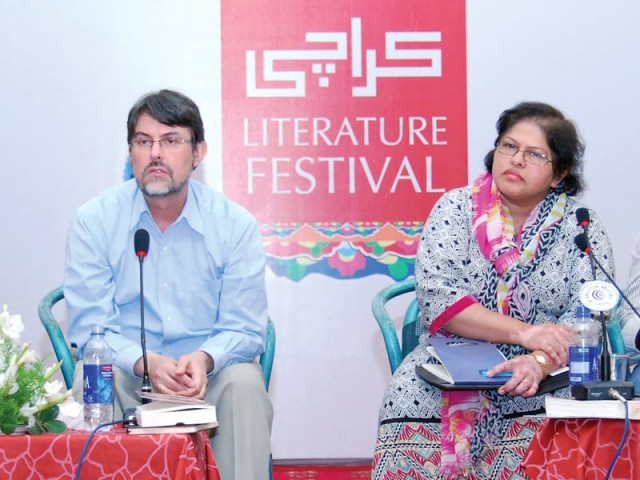A conversation with Anatol Lieven: Siddiqa dangles bait, Lieven doesn’t bite
The scholar talks about his new book on power and resilience in Pakistan.

As the clock ticked two, there was no word on whether the discussion with Ayesha Siddiqa and Anatol Lieven would actually go through, given that Siddiqa had publicly expressed annoyance at how a one-on-one discussion had been turned into a panel discussion with two more authors.
The Ballroom at the Carlton filled up with guests.
But any hopes for a screaming match – or even a loud debate – died an early death because Lieven was rather restrained in his responses.
The scholar opened the session by talking about his book, Pakistan: A Hard Country. “The thesis of the book is that Pakistan works, in some way,” he said. “The book is really about power in Pakistan – where power comes from, who holds power, how power is exercised, how power is legitimised, and crucially, how power is negotiated between different centres.”
He said the book is also about the “resilience and toughness of Pakistan and where it comes from”.
“I had so looked forward to having a one-on-one discussion but that didn’t happen,” Siddiqa said. “I think it is important to recognise the fact that we who are present here and write about Pakistan, take Pakistan very seriously. Pakistan is our home and each one of us wants to make it more liveable.”
Siddiqa said she had read Lieven’s book with deep interest, before delving into a series of prepared questions – replete with references to page numbers.
Siddiqa asked if he had reconsidered any of the points he had made in his book, since it was published. He said he hadn’t, and went on to speak about the “different faces of the Pakistani establishment” shown in recent months.
The grilling continued as she then asked about criticism of his book that noted that he was softer towards the military.
Lieven and Siddiqa went back and forth, while the other two panellists – Mohsin Hamid and Ghazi Salahuddin – sat silently.
He said he had used the word “relative” to compare institutions and had also criticised the military in his book, but went on to talk about the soldiers he had met in hospitals who had been wounded in military operations. Any criticism of the military must come with respect for their sacrifices, he added. “It is the jawans that are fighting up there so that we can meet here.” The remark was followed by applause, as when Lieven suggested that the Pakistani elite should pay taxes.
Siddiqa responded that they did recognise the sacrifices of the soldiers, saying: “Any criticism of the military comes for the sake of the soldiers.”
Hamid finally got a chance to speak, comparing the applause in the hall to a “tennis match” and questioned Lieven on power structures and groups.
The conversation took on a more scholarly note, as Lieven referenced different news events, including riots in the UK, as well as his various studies in Pakistan such as on Pakhtunwali.
Salahuddin commended Lieven on his “star power” and the number of people that had amassed to hear him. He noted that Pakistanis were quite respectful of what foreign writers had to say, and said he was actually a “dose of a tranquiliser”.
No-one appeared to have dozed off now and the unlikely “star” held court for a bit longer.
Published in The Express Tribune, February 12th, 2012.



















COMMENTS
Comments are moderated and generally will be posted if they are on-topic and not abusive.
For more information, please see our Comments FAQ